- Home
- Shih Tzu Information
Shih Tzu Information Guide
What To Know About Shih Tzu Dogs
By Everything Shih Tzu Updated November 3, 2022
This post may contain affiliate links. Read privacy & disclosure policy for info
This Shih Tzu information guide will help you learn all about this special little toy breed.
By the time you get to the end of this page, you'll be an expert on all things Shih Tzu dogs, well, maybe not quite an expert, but certainly a lot more informed about this charming little fluff ball.
And if this isn't enough, you'll find links to additional pages with even more in-depth knowledge! So you never know, you just may become an expert after all.
But for now, let's just get you started with some basic information about this smiling, happy dog.
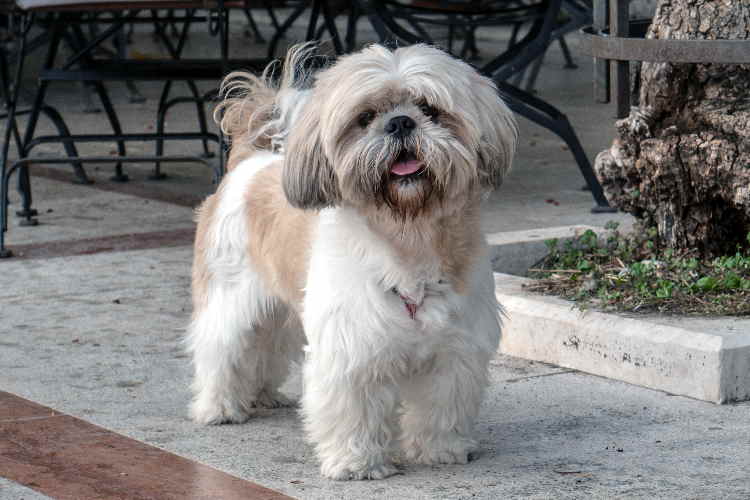
The American Kennel Club (AKC) classifies the Shih Tzu as a toy breed, as their only job is to be a companion dog. And in case you were wondering, Shih Tzu are very good at their job.
See our article "What Shih Tzu Were Bred For" to discover more.
When a Shih Tzu is fully grown, they stand at a mere 9 to 11 inches high and weigh between 9 to 16 pounds.
They may be compact and look pretty and delicate, but don't let their appearance fool you. The Shih Tzu standard breed is a very sturdy dog with a huge personality.
The Imperial Shih Tzu, also referred to as a Teacup and not officially recognized as a breed by the AKC, is much smaller and more fragile than your standard Shih Tzu breed.
The most recognizable features of the Shih Tzu breed is their long flowing hair, broad, round head, and large expressive eyes.
You can't help but say "awww" as they captivate you with their sweet and innocent appearance.
With just a slight tilt of their little heads and the glimpse of their smiling eyes, and you're hooked.
Having three Shih Tzu of my own, it'll come as no surprise that my personal opinion is that they are the best choice of all the small dog breeds.
Yet, they may not be for everyone as they can be a pretty high-maintenance dog when it comes to grooming.
For example, as the Shih Tzu has a lot of hair it tends to tangle and mat when it isn't brushed often.
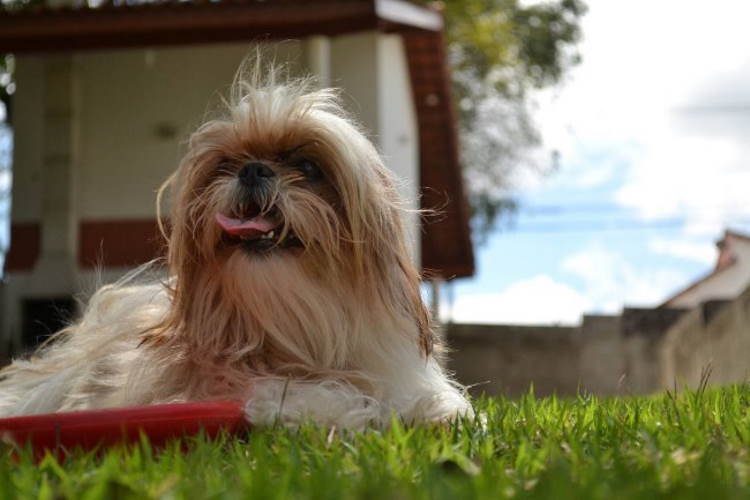 Long haired Shih Tzu dog
Long haired Shih Tzu dogWhenever choosing a dog to live with, whatever the breed, it's necessary to know what you'll be getting yourself into to avoid any mistakes or regrets.
So, if you feel the urge to rush out and bring one, two, or even three, or more of these little bundles of cuteness home on a whim...don't.
Do yourself a favor and give it some serious thought before taking on the role of a caretaker to multiple pets.
Too many dogs end up being surrendered to a shelter because someone wasn't prepared to raise a dog.
They don't have the time, or resources, or they got them as a gift, or they simply lose interest in the novelty of having an adorable little puppy.
If you're ready to be a pet parent and know that you can give a dog the time and attention it needs, please consider adopting a dog.
When getting a pet, you first need to know if they will be a good fit with your lifestyle and whether they will get along with others living in your household and your other pets.
You'll also want to consider whether you have the time, resources, and commitment to raising one of these little cuties.
See our articles "Are Shih Tzu Good Apartment Dogs," "Are Shih Tzu Good With Kids," and, "Do Shih Tzu and Cats Get Along" to learn more.
Click one of the links below to jump directly to that section.
Shih Tzu Health Information
One of the most important aspects to know about the Shih Tzu breed is its health problem, and the typical lifespan of a Shih Tzu so you can plan for the future.

In general, Shih Tzu's are a healthy breed. They do, however, have their share of health issues that may be inherited.
Some of these concerns include:
- Brachycephalic Syndrome
Dogs with short noses are more prone to developing brachycephalic syndrome,
which is a problem with the airflow in the upper respiratory tract.
- Intervertebral disc disease (IVDD)
Also referred to as a slipped or ruptured or herniated disc.
This is a condition where the discs in the spinal column can bulge or burst. It then presses on the nerves causing pain, loss of coordination, or in worst cases, paralysis.
This can happen with any forceful impact while jumping or falling from high beds, couches, or even stairs.
- Keratoconjunctivitis sicca
Commonly known as "dry eye." It's a tear gland disease that doesn't release enough of the needed moisture to keep dogs' eyes lubricated.
A vet may prescribe topical medication like eye drops or other lubricants to help relieve the dryness.
- Distichiasis
Distichiasis is a rare disorder of abnormal growth of hairs on the eyelids.
These eyelashes scratch the eye surface and cause the Shih Tzu to paw at their eyes quite often.
If left untreated, the cornea can become ulcerated, which is very painful to the dog.

Some other health issues may also include:
- Renal Dysplasia
- Skin Issues
- Bone and joint disorders
- Heat exhaustion
- Dental issues
- Ear and eye problems
This may seem like a lot of health issues; however, it is only an example of common health issues that may arise and doesn't necessarily mean your Shih Tzu will develop all of them.
With proper care, your Shih Tzu can live a long and healthy life.
Read our article on "How To Clean A Shih Tzus Eyes" to keep them big, beautiful orbs healthy for years to come.
Temperament Of A Shih Tzu
Since the sole purpose of a Shih Tzu is that of a companion dog, it won't come as a surprise that the Shih Tzu's temperament is that of a devoted, playful, and affectionate breed.
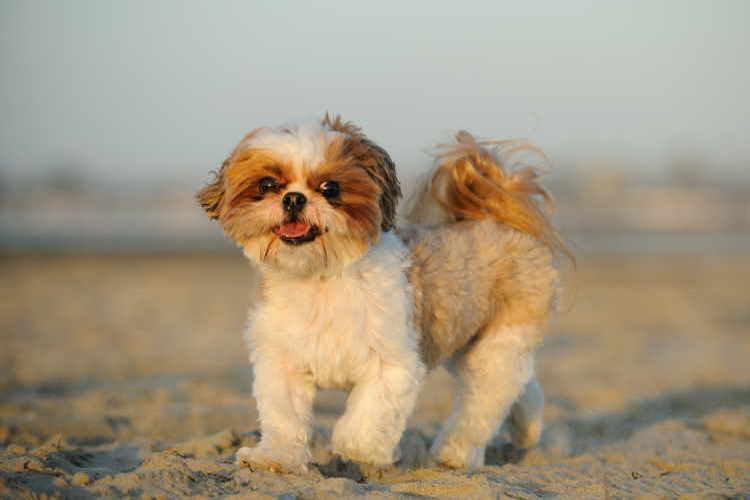
Given a choice, your Shih Tzu would adapt to nearly any environment just as long as they can be near you.
Yet, they are also pretty independent little dogs.
They may seem like they want a lot of attention sometimes. Yet, they keep themselves occupied just fine with a favorite toy or another pet.
The Shih Tzu is not a yappy breed, which means they won't be driving you crazy with their non-stop barking.
However, they may alert you to situations that could need your attention, making them an excellent watchdog.
Their personality can also make for great emotional support dogs, and in some particular areas can be a service dog.
The Shih Tzu gets along well with most other dog breeds. Large or small dogs alike and are not likely to be aggressive toward them.
They generally greet another dog as if they are already friends and really seem to thrive in a multi-dog household.
Learn more about Shih Tzu temperament with these articles:
House Training a Shih Tzu
Anyone bringing a puppy home will have to either hire a trainer or potty train the dog themselves.
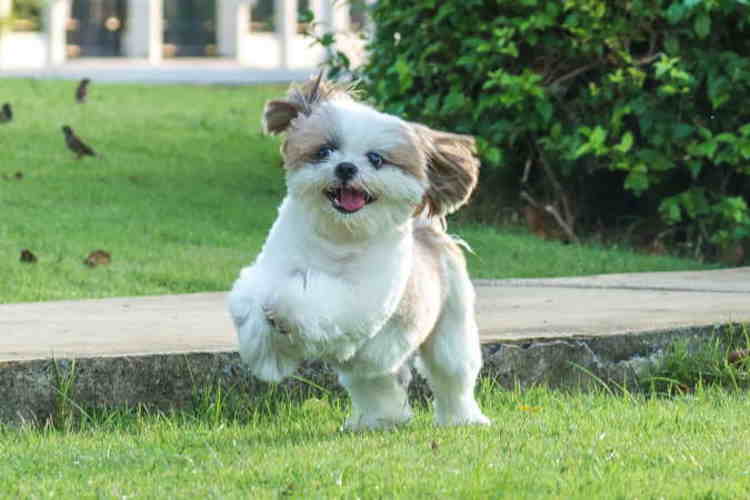
I've heard several times that Shih Tzu can be hard to potty train. That they can be stubborn, and it won't be easy to get them to heed your directions.
To that, I say hogwash!
Granted, they can indeed be stubborn, but the Shih Tzu breed is no harder nor easier to potty train than any other breed.
I've had various dog breeds in my lifetime, big and small, and they were all pretty much the same.
With patience and a daily routine, and some delicious treats, potty training a Shih Tzu can be a breeze.
If getting a dog from a shelter, that dog will likely already know the basics of housetraining. However, you will still have to show them where you want them to do their business once the dog is in your home.
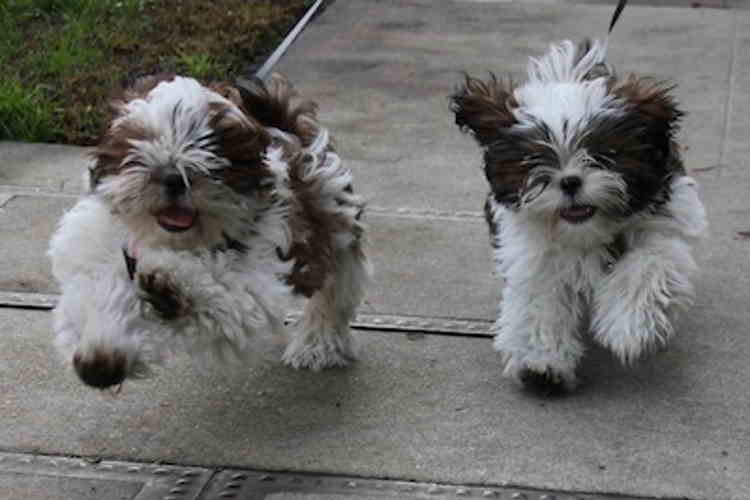
What To Feed A Shih Tzu
One thing you should know about the Shih Tzu dog breed is that they don’t eat very much.
They have little bellies, are not as active as some other dogs, and just don't have a big appetite.
So it's not unusual for them to only eat once or twice a day. And on occasion, when they need to settle their tummy's, they won't eat at all.
So don't go into a panic mode if you notice that your Shih Tzu is not eating as much as it normally does or as much as other dogs do on any given day.
If your dog refuses to eat for just a day, there may be no need to rush off to the emergency room unless you see indications that they may be sick or is throwing up.
On those occasions when he is turning his nose up to his food, you must still make sure they always have access to clean water to stay hydrated.
As far as deciding between wet or dry food, either will be fine for them.
But do keep in mind Shih Tzu have tiny teeth and may not be able to chew large kibble. Try getting a kibble specifically for small breeds, as this will make it easier for them to chew.
Shih Tzu can eat most foods, but it's worth mentioning that the better quality their food, the better their coats look and feel.
If you have the time and know-how, try making them a nutritious homecooked meal. This is an excellent way to make sure they are getting quality ingredients and a healthy diet.
I've heard over the years that you should never feed dog's pork, as they can't digest it well, resulting in diarrhea and vomiting.
Use your own judgment to determine if that is the case with your own dog. My dogs do not seem to like the pork dog food, but that may be a coincidence.
If you are still uncertain about which dog food to feed to your Shih Tzu, I'm sure your veterinarian will be able to give you some great recommendations.
You've probably noticed that the Shih Tzu have flat faces.
Their noses are nearly level with their face, making eating out of a regular deep dog food bowl a little more challenging for them, and they end up leaving food in the bowl.
When picking out dog supplies consider getting a shallow bowl which will make it much easier for them to get all their yummy food.

Grooming Your Shih Tzu
This dog breed is naturally adorable, so they really do not need much grooming just to look good.
But when it comes to grooming, the Shih Tzu can be a relatively high-maintenance little dog.
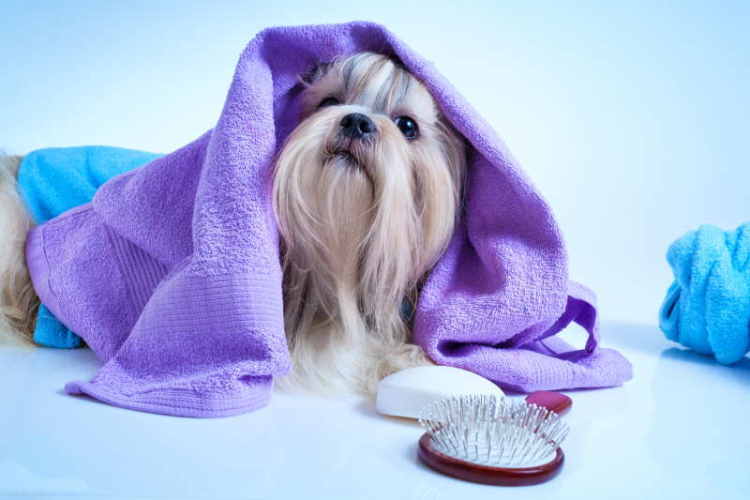
Although many consider the Shih Tzu to be a non-shedding dog breed, that isn't entirely accurate.
The truth is the Shih Tzu has hair much like humans. And like humans, they will shed some of that hair every day.
This hair gets caught in their coats, and if not brushed out, that long flowing coat will become tangled and matted.
Grooming a Shih Tzu with a long coat occurs more often than with a short-haired dog and can get quite expensive if you pay someone else to groom them.
Or, if you're doing it yourself, very time-consuming.
So, if you want to keep your Shih Tzu in showroom condition, be prepared to spend a lot of time just maintaining their hair.
It can take hours each day brushing their long flowing locks to keep it in perfect condition.
Shih Tzu show dogs are usually bathed weekly.
If you plan to have a Shih Tzu as a companion only, bathing them every 3 to 4 weeks is generally fine, unless they get filthy.
Still then, a full bath may not be necessary. Instead, you may only need to rinse them off, dry them, and brush them.
Take a few minutes each day to brush their hair, wiping their faces, and cleaning the eye area.
If you get into a daily habit of doing these few things, you will find that maintaining them isn't all that bad.
And, as an added benefit, you can stretch out the time they need to go to the groomers to about every four to six weeks.
Even if you keep your Shih Tzu’s hair short, they still will need brushing and baths, although not nearly as often.
And while on the subject of grooming, don't forget about the Shih Tzus eyes and ears.
These areas are often overlooked until an infection sets in.
Their big eyes tend to attract dirt and can become overgrown with mucous. If not regularly cleaned, bacteria can set it and lead to an eye infection.
The Shih Tzu ears have flaps that hang down and cover their ears. Dirt and moisture gets trapped inside and can cause bacteria to grow if not kept clean and dry.
See our article Grooming Your Shih Tzu Dog to learn how to keep your dog clean and healthy.
Shih Tzu Coat Colors
The Shih Tzu comes in a variety of coat colors. They may have a solid color or, more likely, two or sometimes three or more colors, which are commonly called a "brindle" Shih Tzu.
Here are just some of the Shih Tzu colors you may come across.
SOLID COLORS
- Black
- Gold
- Red
- Silver
- Brindle
- Liver
- Blue
- White
COLOR MIXES
- Black & White
- Gold & White
- Red & White
- Silver & White
- Brindle & White
- Liver & White
Liver and Blue colors do not refer to the coat color but rather the color of their nose, eye rims, lips, and paw pads.
The rarest color of Shih Tzu is blue, solid black and solid white.
You may have also seen colors listed like Lavender, Chocolate, and Isabella. However, these colors are not standard and are basically a "Liver" colored Shih Tzu.
See our article "Can Shih Tzu Have Blue Eyes" to learn about this rare phenomenon.
Shih Tzu History and Facts
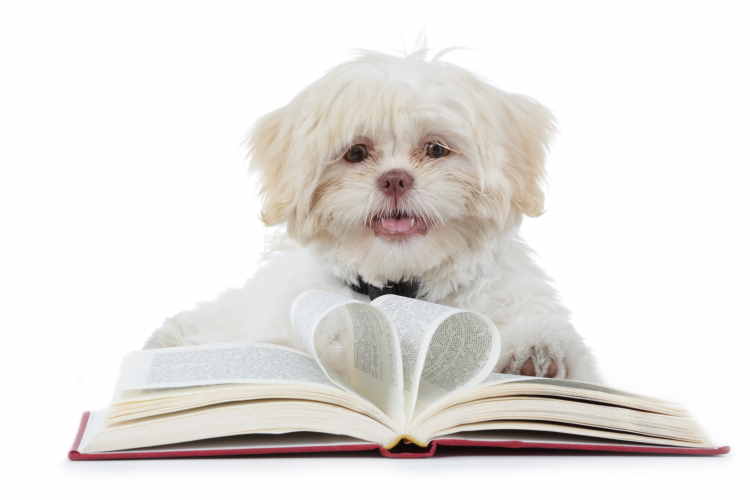
The history of the Shih Tzu breed is a long one, whose ancestors were developed in Asia as far back as the year 1000.
Several people think the Shih Tzu is a mix between the Llasa Apso and the Pekinese breed, while others believe the Shih Tzu may be related to the pug.
What is commonly believed, however, is this breed originated in Tibet and was brought to China in the 16th century as gifts to royalty.
The Shih Tzu was a favorite of Empress Dowager Cixi and were bred until she died in the early 1900s.
After her death, breeding had all but stopped, and a few Shih Tzu were either sold or given as gifts to foreigners.
As it would turn out, these few Shih Tzu would be the means of the breed's survival.
When communists came to power, they destroyed Shih Tzu and other palace dogs, as they were said to be a drain on resources.
If it weren't for those few that survived, the Shih Tzu would not be a part of our world today!
Learn more about Shih Tzu history and other interesting Shih Tzu Facts.
Final Reflections About Shih Tzu Dogs
"A dash of lion, several teaspoons of rabbit, a couple of ounces of domestic cat, one part court jester, a dash of ballerina, a pinch of old Chinese man, a bit of beggar, a tablespoon of monkey, one part baby seal, and a dash of teddy bear." ~ James E. Mumford
Before buying or adopting a Shih Tzu dog, you need to know what you are getting into.
Learning about the Shih Tzus health, grooming, and dietary needs will help you better understand what it means to care for this charming little lap dog.
And discovering their history may help in understanding their confident personality better.
There is a wealth of Shih Tzu information you will find on this website. Information that will help ensure that you can provide your new companion with the highest quality care and love possible.
I hope this information about the Shih Tzu dog breed has answered many of your questions.
But if not, be sure to click on some of the links scattered throughout this article to discover even more about the Shih Tzu dog.
More Information About Shih Tzu You May Find Helpful:
- 25 Best Girl Names for Shih Tzu - Are you having a hard time deciding what to call your new Shih Tzu? Maybe a few of these names will help inspire you.
- Do Shih Tzu Get Cold in Winter? Since your Shih Tzu comes complete with a long, silky coat, you might think they are well protected against the cold weather that winter brings, but does it?
- Do Shih Tzu need a lot of exercise? All dogs benefit from exercise, and short daily walks are the best exercise to keep them active and healthy. But, be careful not to over-exercise a Shih Tzu.
- More articles like Can You Jog With a Shih Tzu and Can a Shih Tzu Swim gives you more insight into how much exercise a Shih Tzu needs.
- What a Senior Shih Tzu Needs - Whether you adopt an older dog or you’ve had your faithful friend by your side for many years, a senior dog needs some special love and care.
- Why Shih Tzu Dogs Sleep So Much - why do dogs need so much more sleep than humans? And when should you worry that your dog's sleeping a little too much?
- Want more articles about Shih Tzu's behavior? Why Dogs Eat Grass, What Dogs Dream About and Why Dogs Lick Their Paws, and How To Talk Dog will provide you with further information about Shih Tzu
- What is a Havashu? Learn how this designer dog compares to the standard Shih Tzu.
- Training article that include How to Stop Your Shih Tzu from Barking at Other Dogs and How To Stop Your Shih Tzu From Barking At Night.
- Why Dogs Bite Their Paws, Legs and Tail? This can be out of boredom or an underlying health issue. Know how to tell the difference and how you can stop this bad habit.
- Dogs and rabbits living together under one roof, can it be safe? Learn how to these unnatural companions can be buddy's in your home.
- Home
- Shih Tzu Information



